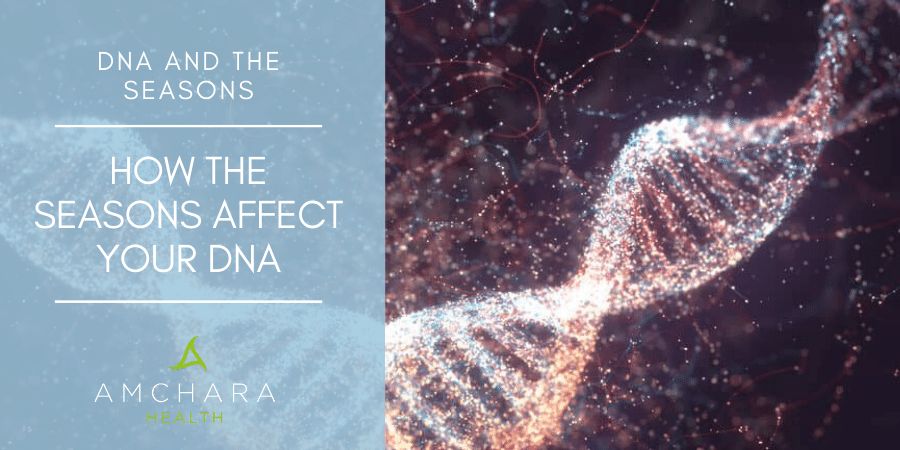In recent years, research has discovered a wealth of information about the extent to which genes control the body’s processes.
It’s easy to accept genes affect how we look and how susceptible we are to various diseases, but does our genetic inheritance also influence our emotions?
Many thousands of complex variations in your genes impact on how your body reacts to all kinds of circumstances.
In this article we’ll look at the genetic basis behind depression, which is a disease characterised by severe, persistent low mood.
How Widespread is Depression?
The UN estimates around 300 million people worldwide are living with depression.
In fact, it’s the most common mental health issue in the world.
According to Mind UK, over 3% of the UK population suffers from depression at any one time (1) and more women are affected than men.
Depression exists in many forms, each with its own symptom pattern.
Examining Genetics and Mood
Our genetic material affects the production and activity of proteins which direct cells how to behave and respond to all sorts of signals, including the chemicals which control brain communication.
In the past, genetic aspects involved in mood disorders have been examined by looking at pairs of twins. Identical twins share all their genes, while non-identical twins have only half of their genetic material in common.
If genes contribute to depression, we would expect the identical twin of a person with depression to have a higher risk of suffering from the disease than a non-identical twin, and this appears to be the case.
If someone has a parent with depression, they are around three times more likely to develop the disease than the average person (2).
However, it’s often hard to separate out the effects of similar environment and upbringing.
Other studies have looked at people who were adopted whose risk of depression appeared to be greater if their biological parent suffered from the disease.
The Serotonin Gene
Research has identified one specific gene which is concerned with the transport and recycling of serotonin in the brain.
Serotonin is a neurotransmitter which helps to regulate mood and social behaviour – often nicknamed the ‘happy chemical’, it tends to be low in cases of depression.
The serotonin gene affects a cell-membrane protein involved in the transportation of the neurotransmitter into nerve cells.
Slight variations in this gene, known as polymorphisms, can affect the rate of serotonin uptake, a process which enables it to be recycled and used again.
What we don’t know at present is how, or to what extent, differences in this gene impact on behaviour and depression.
Small studies in the past have suggested variations of this gene, especially when accompanied by childhood trauma, are positively associated with depression.
It appears alterations in the lengths of these genes determine how resilient people are to stress.
Other studies have discovered genes which cause some people’s nerve cells to be physically different, which affects how they produce and use serotonin (3).
This influences how these people respond to the most commonly-prescribed antidepressant drugs, SSRIs, which are designed to increase the amount of serotonin present in nerve junctions – around 30% of patients don’t respond to these drugs.
Projections on brain cells called neurites carry signals to and from nerve cells.
By studying cells from people with severe depression, researchers found those who don’t respond to SSRIs had neurites of different sizes and shapes than to those who do.
It’s thought neurites of the wrong length can interfere with serotonin communication networks.
Expression of two specific genes known to play a role in the growth and formation of nerve cells and brain circuits were much weaker in the people who didn’t respond to the antidepressants.
The Role of Galanin
Galanin is a less well known brain chemical than serotonin.
It’s believed to be important for the regulation of pain, sleep and waking, blood pressure and mood.
It’s also thought to play a role in stress and anxiety – in the development of depression galanin appears to cause people to become more vulnerable to stress.
In one study, people who had experienced stressful life events were more likely to suffer from depression if they had mutations in their genes associated with the release of galanin.
The effects of the galanin gene variants were stronger than those of serotonin gene variants (4).
Depression and Genetics – a Complex Relationship
Research into the human genome has so far identified over 250 genetic links involved in depression and anxiety.
A recent large-scale study reveals the picture to be incredibly complex, with no single gene having an overriding effect.
Most likely it is the interactions between the large numbers of different gene variants which all manifest diverse effects on mood (5).
Genes can affect both neurotransmitter release and function, as well as the structure of synapses, the gaps between nerve cells into which neurotransmitters are released to pass nerve impulses from cell to cell.
Environment and Genetics
Environment undoubtedly plays a significant part in the development of psychological disorders such as depression.
Life events such as Now that large meta-analyses of genome-wide association studies (GWAS) have been published for bipolar disorder and major depression it has become clear that main effects of common variants are difficult to identify in these disorders, suggesting that additional approaches maybe needed to understand the genetic basis of these disorders [2,3].
childhood abuse or neglect, poor social environment, poverty and severe stress, such as losing a parent, can all play a part.
It’s thought only around 30-40% of the risk of developing depression and anxiety are genetic, with the remainder associated with environmental factors.
These genes and environmental factors interact to increase the likelihood of mood disorders.
As we saw with galanin, genetic differences can influence our resilience to our environment, such as stress and trauma.
This supports the idea that the interaction between genes and the environment is greater than genetics or environment alone.
Personalised Treatment for Depression
One ongoing study, called the Genetic Links to Anxiety and Depression Study (6), is looking at the DNA records of over 800,000 people with the aim of developing treatments for depression, personalised to the patient’s particular genetic picture.
Researchers have identified sections of DNA common to both those suffering from depression and those partaking of behaviour such as smoking, which could mean depression is likely to lead people to smoke.
If science can understand more about how the environment affects genetic risk factors, new targets could be identified for treatments.
Depression and Lifespan
In a fascinating study, scientists have identified a series of genes which may be involved in the effects of mood and stress response as well as how long we live (7).
One particular gene was identified as playing a role in longevity and appears to increase its expression with age.
People who had severe depression, or those who had committed suicide, had changes in the expression of this gene associated with ageing and reduced lifespan.
Taking this one step further, in the case of worms at least, administering an antidepressant to enhance the action of serotonin also extended lifespan and altered gene activity towards that seen in younger worms.
These findings demonstrate how physical and emotional health are tightly connected by genetics.
Conclusion
Although we are influenced by genetic predispositions, to a large extent environmental factors determine if these tendencies manifest themselves.
We have a lot more to learn on this subject, but in the case of depression, lifestyle and environment play a significant role.
At Amchara we believe we are all individual, interacting with our unique environment.
This acknowledgement of the close link between lifestyle, nutrition and both mental and physical health is at the heart of our philosophy.
A consultation with an Amchara Personalised Health practitioner will include a thorough investigation into your symptoms and functional tests will be recommended as appropriate.
For example, a DNA test can measure the activity of genes associated with neurotransmitter balance.
We believe sharing knowledge and experience is an important part of achieving optimal health.
We would love to hear your views and experiences.
Tell us where you started, what has helped you and what you found useful about this article.
Read this next:




